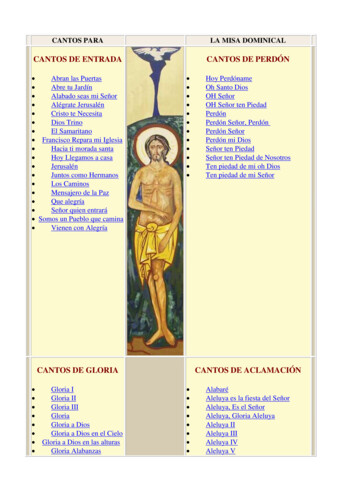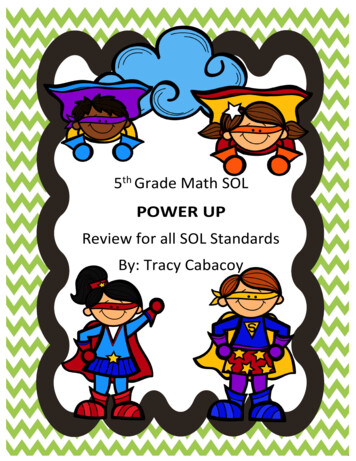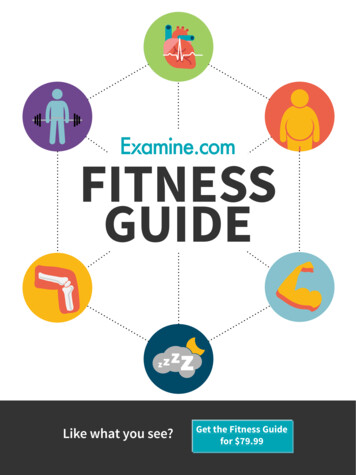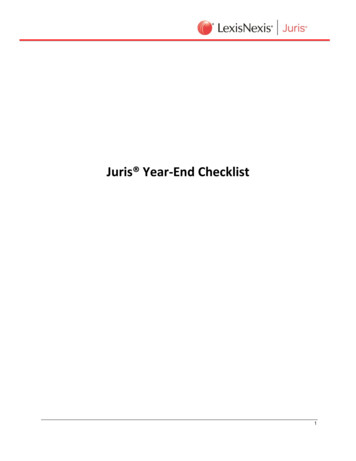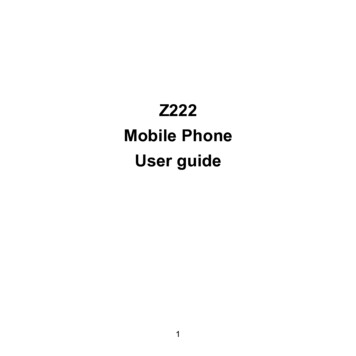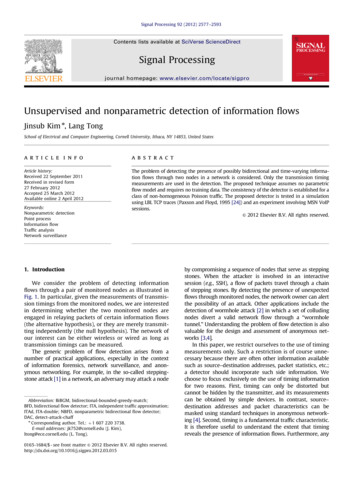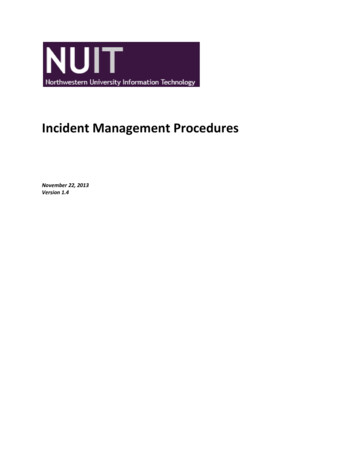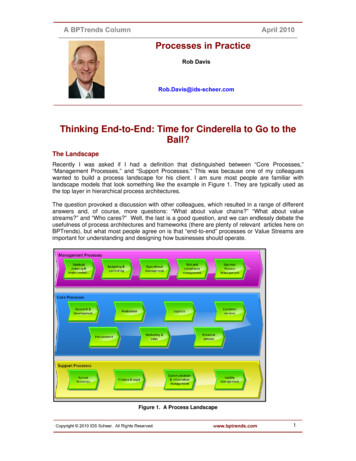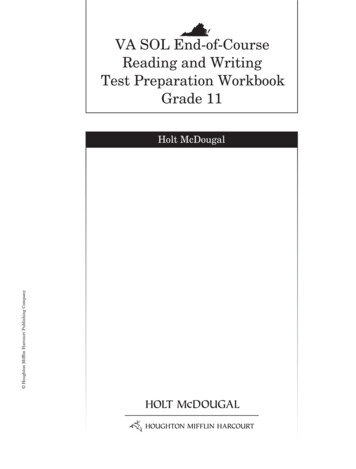
Transcription
VA SOL End-of-CourseReading and WritingTest Preparation WorkbookGrade 11 Houghton Mifflin Harcourt Publishing CompanyHolt McDougal
All rights reserved. No part of this work may be reproduced or transmitted in any form or by anymeans, electronic or mechanical, including photocopying or recording, or by any informationstorage or retrieval system, without the prior written permission of the copyright owner unless suchcopying is expressly permitted by federal copyright law. Requests for permission to make copies ofany part of the work should be addressed to Houghton Mifflin Harcourt Publishing Company, Attn:Contracts, Copyrights, and Licensing, 9400 South Park Center Loop, Orlando, Florida 32819.Printed in the U.S.A.ISBN 978-0-547-72348-81 2 3 4 5 6 7 8 9 10 TK450000000020 19 18 17 16 15 14 13 12 11ABCDEFGIf you have received these materials as examination copies free of charge, Houghton MifflinHarcourt Publishing Company retains title to the materials and they may not be resold. Resaleof examination copies is strictly prohibited.Possession of this publication in print format does not entitle users to convert this publication,or any portion of it, into electronic format. Houghton Mifflin Harcourt Publishing CompanyCopyright by Houghton Mifflin Harcourt Publishing Company
Contents Houghton Mifflin Harcourt Publishing CompanyPractice Tests:Reading Practice Test 1 . 1Reading Practice Test 2 . 31Writing Practice Test 1 . 59Writing Practice Test 2 . 81
Reading Practice Test 1DirectionsRead the poem. Then read each question about the passage. Decide which is the best answer toeach question. Mark the space in your answer booklet for the answer you have chosen.SAMPLEDo not weep, maiden, for war is kindby Stephen CraneDo not weep, maiden, for war is kind.Because the lover threw wild hands toward the skyAnd the affrighted steed ran on alone,Do not weep.War is kind.Hoarse, booming drums of the regiment,Little souls who thirst for fight,These men were born to drill and die.The unexplained glory flies above them,Great is the Battle-God, great, and his Kingdom—A field where a thousand corpses lie. Houghton Mifflin Harcourt Publishing CompanyDo not weep, babe, for war is kind.Because your father tumbled in the yellow trenches,Raged at his breast, gulped and died,Do not weep.War is kind.Swift blazing flag of the regiment,Eagle with crest of red and gold,These men were born to drill and die.Point for them the virtue of slaughter,Make plain to them the excellence of killingAnd a field where a thousand corpses lie.Mother whose heart hung humble as a buttonOn the bright splendid shroud of your son,Do not weep.War is kind.AIn this poem, the speaker addressesBWhich is an example of alliteration?Aa maiden, a soldier, and an eagle.Fheart hung humbleBa soldier, a flag, and a battlefield.Gthrew hands wildCa lover, the Battle-God, and amother.Hswift blazing flagDJa maiden, a child, and a mother.hoarse, booming drumsGrade 11 Reading Practice Test 11
DirectionsRead the passage and answer the questions that follow.from The Jungle21“But we don’t have to pay any interest!” they exclaimed, three or four at once. “We only haveto pay twelve dollars each month.” And for this she laughed at them. “You are like all the rest,”she said; “they trick you and eat you alive. They never sell the houses without interest. Get yourdeed, and see.”2Then, with a horrible sinking of the heart, Teta Elzbieta unlocked her bureau and brought out thepaper that had already caused them so many agonies. Now they sat round, scarcely breathing,while the old lady, who could read English, ran over it. “Yes,” she said, finally, “here it is, ofcourse: ‘With interest thereon monthly, at the rate of seven per cent per annum.’”3And there followed a dead silence. “What does that mean?” asked Jurgis finally, almost in awhisper.4“That means,” replied the other, “that you have to pay them seven dollars next month, as wellas the twelve dollars.”5Then again there was not a sound. It was sickening, like a nightmare, in which suddenlysomething gives way beneath you, and you feel yourself sinking, sinking, down into bottomlessabysses. As if in a flash of lightning they saw themselves—victims of a relentless fate, cornered,trapped, in the grip of destruction. All the fair structure of their hopes came crashing abouttheir ears.—And all the time the old woman was going on talking. They wished that she wouldbe still; her voice sounded like the croaking of some dismal raven. Jurgis sat with his handsclenched and beads of perspiration on his forehead, and there was a great lump in Ona’s throat,choking her. Then suddenly Teta Elzbieta broke the silence with a wail, and Marija began towring her hands and sob, “Ai! Ai! Beda man!”6All their outcry did them no good, of course. There sat Grandmother Majauszkiene, unrelenting,typifying fate. No, of course it was not fair, but then fairness had nothing to do with it. And ofcourse they had not known it. They had not been intended to know it. But it was in the deed,and that was all that was necessary, as they would find when the time came.7Somehow or other they got rid of their guest, and then they passed a night of lamentation. Thechildren woke up and found out that something was wrong, and they wailed and would notbe comforted. In the morning, of course, most of them had to go to work, the packing houseswould not stop for their sorrows; but by seven o’clock Ona and her stepmother were standing atthe door of the office of the agent. Yes, he told them, when he came, it was quite true that theywould have to pay interest. And then Teta Elzbieta broke forth into protestations and reproaches,so that the people outside stopped and peered in at the window. The agent was as bland as ever.He was deeply pained, he said. He had not told them, simply because he had supposed theywould understand that they had to pay interest upon their debt, as a matter of course.8So they came away, and Ona went down to the yards, and at noontime saw Jurgis and toldhim. Jurgis took it stolidly—he had made up his mind to it by this time. It was part of fate; theywould manage it somehow—he made his usual answer, “I will work harder.” It would upsettheir plans for a time; and it would perhaps be necessary for Ona to get work after all. ThenOna added that Teta Elzbieta had decided that little Stanislovas would have to work too. It wasnot fair to let Jurgis and her support the family—the family would have to help as it could.Previously Jurgis had scouted this idea, but now knit his brows and nodded his head slowly—yes, perhaps it would be best; they would all have to make some sacrifices now.VA SOL End-of-Course Reading and Writing Test Preparation, Grade 11 Houghton Mifflin Harcourt Publishing Companyby Upton Sinclair
Houghton Mifflin Harcourt Publishing Company9So Ona set out that day to hunt for work; and at night Marija came home saying that shehad met a girl named Jasaityte who had a friend that worked in one of the wrapping roomsin Brown’s, and might get a place for Ona there; only the forelady was the kind that takespresents—it was no use for any one to ask her for a place unless at the same time they slippeda ten-dollar bill into her hand. Jurgis was not in the least surprised at this now—he merelyasked what the wages of the place would be. So negotiations were opened, and after aninterview Ona came home and reported that the forelady seemed to like her, and had said that,while she was not sure, she thought she might be able to put her at work sewing covers onhams, a job at which she would earn as much as eight or ten dollars a week. That was a bid, soMarija reported, after consulting her friend; and then there was an anxious conference at home.The work was done in one of the cellars, and Jurgis did not want Ona to work in such a place;but then it was easy work, and one could not have everything. So in the end Ona, with a tendollar bill burning a hole in her palm, had another interview with the forelady.10Meantime Teta Elzbieta had taken Stanislovas to the priest and gotten a certificate to the effectthat he was two years older than he was; and with it the little boy now sallied forth to make hisfortune in the world. It chanced that Durham had just put in a wonderful new lard machine, andwhen the special policeman in front of the time station saw Stanislovas and his document, hesmiled to himself and told him to go—“Czia! Czia!” pointing. And so Stanislovas went down along stone corridor, and up a flight of stairs, which took him into a room lighted by electricity,with the new machines for filling lard cans at work in it. The lard was finished on the floorabove, and it came in little jets, like beautiful, wriggling, snow-white snakes of unpleasant odor.There were several kinds and sizes of jets, and after a certain precise quantity had come out,each stopped automatically, and the wonderful machine made a turn, and took the can underanother jet, and so on, until it was filled neatly to the brim, and pressed tightly, and smoothedoff. To attend to all this and fill several hundred cans of lard per hour, there were necessary twohuman creatures, one of whom knew how to place an empty lard can on a certain spot everyfew seconds, and the other of whom knew how to take a full lard can off a certain spot everyfew seconds and set it upon a tray.11And so, after little Stanislovas had stood gazing timidly about him for a few minutes, a manapproached him, and asked what he wanted, to which Stanislovas said, “Job.” Then the mansaid “How old?” and Stanislovas answered, “Sixtin.” Once or twice every year a state inspectorwould come wandering through the packing plants, asking a child here and there how old hewas; and so the packers were very careful to comply with the law, which cost them as muchtrouble as was now involved in the boss’s taking the document from the little boy, and glancingat it, and then sending it to the office to be filed away. Then he set some one else at a differentjob, and showed the lad how to place a lard can every time the empty arm of the remorselessmachine came to him; and so was decided the place in the universe of little Stanislovas, andhis destiny till the end of his days. Hour after hour, day after day, year after year, it was fatedthat he should stand upon a certain square foot of floor from seven in the morning until noon,and again from half-past twelve till half-past five, making never a motion and thinking nevera thought, save for the setting of lard cans. In summer the stench of the warm lard would benauseating, and in winter the cans would all but freeze to his naked little fingers in the unheatedcellar. Half the year it would be dark as night when he went in to work, and dark as night againwhen he came out, and so he would never know what the sun looked like on weekdays. And forthis, at the end of the week, he would carry home three dollars to his family, being his pay at therate of five cents per hour—just about his proper share of the total earnings of the million andthree-quarters of children who are now engaged in earning their livings in the United States.12And meantime, because they were young, and hope is not to be stifled before its time, Jurgisand Ona were again calculating; for they had discovered that the wages of Stanislovas would alittle more than pay the interest, which left them just about as they had been before! It would bebut fair to them to say that the little boy was delighted with his work, and at the idea of earninga lot of money; and also that the two were very much in love with each other.Grade 11 Reading Practice Test 13
234In the passage, what does the author suggest is the main cause of the working poor losingthe houses in which they live?Athe high price of the houseBthe interest that must be paid on the debtCthe extravagant lifestyle of the homeownersDlaziness on the part of the homeownersWhat tone is set in paragraph 5 of the passage?FoptimisticGdefeatedHhumorousJdefiantTo which of the following literary movements does this passage belong?AAmerican GothicBTranscendentalismCThe Harlem RenaissanceDSocial ProtestVA SOL End-of-Course Reading and Writing Test Preparation, Grade 11 Houghton Mifflin Harcourt Publishing Company1
4 Houghton Mifflin Harcourt Publishing Company56Which of the following social conditions is reflected in the passage?FIndustry exploited children by paying them one-third the wages paid to an adult.GThe owners of industry valued their workers and provided decent housing for them.HOrphans were well-cared for by the state and the church.JAccess to medical treatment was readily available to the poor.Which of the following is an example of a logical fallacy?AJurgis and Teta thinking that they bought their house without having to pay interest.BOna setting out to look for work.CStanislovas getting a certificate saying he was two years older than he really was.DThe family paying the interest with the money Stanislovas earned.From this passage, you can tell that –Fimmigrant families had a much better life in the United States than they did in theirformer country.Gimmigrants were forced to send their children to work so that their families could survive.Hthe families of workers who were injured or killed on the job were well provided for bytheir employers.Jworkers had many opportunities for advancement.Grade 11 Reading Practice Test 15
89106Which statement is ironic?A“The lard was finished on the floor above, and it came in little jets, like beautiful, wriggling,snow-white snakes of unpleasant odor.”B“It was sickening, like a nightmare, in which suddenly something gives way beneath you,and you feel yourself sinking, sinking, down into bottomless abysses.”C“It would upset their plans for a time; and it would perhaps be necessary for Ona to getwork after all.”D“Once or twice every year a state inspector would come wandering through the packingplants, asking a child here and there how old he was; and so the packers were very carefulto comply with the law, which cost them as much trouble as was now involved in theboss’s taking the document from the little boy, and glancing at it, and then sending it to theoffice to be filed away.”Which of the following statements expresses one of the themes of the passage?FA job was available for any person willing to work.GImmigrants could improve their circumstances in life through hard work and luck.HUnions were instrumental in gaining decent working conditions for immigrants.JBusiness owners exploited the cheap labor provided by immigrants.From the author’s choice of words in paragraph 11, you can tell that the author –Afavors children working to support their families.Bdisapproves of the way children are forced to work.Cthinks that children are adequately compensated for the work they perform.Dbelieves that children’s labor is necessary for businesses to be successful.At the time in history reflected in this passage, which of the following occurred?FChildren often attended daycare centers while their parents worked.GThe government required people who held a mortgage on property to clearly explain tothe borrower the amount of interest paid on a loan at the time of purchase.HSome parents lied about the age of their children so their children could work.JChild labor laws were rigorously enforced.VA SOL End-of-Course Reading and Writing Test Preparation, Grade 11 Houghton Mifflin Harcourt Publishing Company7
DirectionsRead the passage and answer the questions that follow.Excerpted from Jane Eyreby Charlotte BronteThere was no possibility of taking a walk that day. We had been wandering, indeed, in theleafless shrubbery an hour in the morning; but since dinner (Mrs. Reed, when there was nocompany, dined early) the cold winter wind had brought with it clouds so sombre, and a rain sopenetrating, that further out-door exercise was now out of the question.I was glad of it: I never liked long walks, especially on chilly afternoons: dreadful to me wasthe coming home in the raw twilight, with nipped1 fingers and toes, and a heart saddened bythe chidings2 of Bessie, the nurse, and humbled by the consciousness of my physical inferiorityto Eliza, John, and Georgiana Reed.The said Eliza, John, and Georgiana were now clustered round their mama in the drawingroom:3 she lay reclined on a sofa by the fireside, and with her darlings about her (for the timeneither quarrelling nor crying) looked perfectly happy. Me, she had dispensed from joiningthe group; saying, “She regretted to be under the necessity of keeping me at a distance;but that until she heard from Bessie, and could discover by her own observation, that I wasendeavouring in good earnest to acquire a more sociable and childlike disposition, a moreattractive and sprightly manner—something lighter, franker, more natural, as it were—shereally must exclude me from privileges intended only for contented, happy, little children.”“What does Bessie say I have done?” I asked.“Jane, I don’t like cavillers4 or questioners; besides, there is something truly forbidding5in a child taking up her elders in that manner. Be seated somewhere; and until you can speakpleasantly, remain silent.”Folds of scarlet drapery shut in my view to the right hand; to the left were the clear panesof glass, protecting, but not separating me from the drear November day. At intervals, whileturning over the leaves of my book, I studied the aspect of that winter afternoon. Afar, it offereda pale blank of mist and cloud; near a scene of wet lawn and storm-beat shrub, with ceaselessrain sweeping away wildly before a long and lamentable8 blast.I returned to my book—Bewick’s History of British Birds: the letterpress9 thereof I caredlittle for, generally speaking; and yet there were certain introductory pages that, child as I was,I could not pass quite as a blank. They were those which treat of the haunts of sea-fowl; of “thenipped: numb with cold.chidings: criticisms or disapproval.drawing-room: a room in a house for entertaining company.cavillers (kăv l- rz): persons who make unimportant objections.forbidding: frightening or discouraging.sat cross-legged, like a Turk: old saying, that means to sit with legs crossed.shrined in double retirement: enclosed and hidden very well.lamentable (l -mĕn t -b l): sorrowful.letterpress: the text of a book.e ee1.2.3.4.5.6.7.8.9.e e Houghton Mifflin Harcourt Publishing CompanyA breakfast-room adjoined the drawing-room, I slipped in there. It contained a bookcase:I soon possessed myself of a volume, taking care that it should be one stored with pictures.I mounted into the window-seat: gathering up my feet, I sat cross-legged, like a Turk;6 and,having drawn the red moreen curtain nearly close, I was shrined in double retirement.7Grade 11 Reading Practice Test 17
solitary rocks and promontories”10 by them only inhabited; of the coast of Norway, studdedwith isles from its southern extremity,11 the Lindeness, or Naze, to the North Cape—“Where the Northern Ocean, in vast whirls,Boils round the naked, melancholy islesOf farthest Thule; and the Atlantic surgePours in among the stormy Hebrides.”Nor could I pass unnoticed the suggestion of the bleak shores of Lapland, Siberia,Spitzbergen, Nova Zembla, Iceland, Greenland, with “the vast sweep of the Arctic Zone, andthose forlorn12 regions of dreary space, —that reservoir of frost and snow, where firm fields ofice, the accumulation of centuries of winters, glazed in Alpine heights above heights, surroundthe pole, and concentre the multiplied rigours of extreme cold.” Of these death-white realmsI formed an idea of my own: shadowy, like all the half-comprehended notions that float dimthrough children’s brains, but strangely impressive. The words in these introductory pagesconnected themselves with the succeeding vignettes,13 and gave significance to the rockstanding up alone in a sea of billow14 and spray; to the broken boat stranded on a desolatecoast; to the cold and ghastly moon glancing through bars of cloud at a wreck just sinking.I cannot tell what sentiment15 haunted the quite solitary churchyard, with its inscribedheadstone; its gate, its two trees, its low horizon, girdled16 by a broken wall, and its newly-risencrescent, attesting the hour of eventide.17The two ships becalmed18 on a torpid19 sea, I believed to be marine phantoms.20The fiend pinning down the thief’s pack behind him, I passed over quickly: it was an objectof terror.So was the black horned21 thing seated aloof on a rock, surveying a distant crowdsurrounding a gallows.22With Bewick on my knee, I was then happy: happy at least in my way. I feared nothing butinterruption, and that came too soon. The breakfast-room door opened.“Boh! Madam Mope!” cried the voice of John Reed; then he paused: he found the roomapparently empty.eeee8promontories (prŏm n-tôr-e-- z): high points of land that stick into the sea.extremity (ı̆k-strĕm ı̆-te-- ): farthest point or part.forlorn (f r-lôrn ): hopeless.vignettes (vı̆n-yĕts ): short word pictures or descriptions.billow: waves.sentiment: thought or feeling.girdled (gûr dld): encircled.eventide (e-- v n-tı̄d): evening.becalmed (bı̆-käm d): stopped by a lack of wind.torpid (tôr pı̆d): having little or no motion.marine phantoms (m -re-- n făn t mz): sea ghosts.horned: having horns.gallows: a structure from which people are hanged.hearth (härth): the area in front of a 23.VA SOL End-of-Course Reading and Writing Test Preparation, Grade 11 Houghton Mifflin Harcourt Publishing CompanyEach picture told a story; mysterious often to my undeveloped understanding and imperfectfeelings, yet ever profoundly interesting: as interesting as the tales Bessie sometimes narratedon winter evenings, when she chanced to be in good humour; and when, having brought herironing-table to the nursery hearth,23 she allowed us to sit about it, and while she got up Mrs.Reed’s lace frills, and crimped her nightcap borders, fed our eager attention with passagesof love and adventure taken from old fairy tales and other ballads; or (as at a later period Idiscovered) from the pages of Pamela, and Henry, Earl of Moreland.
“Where the dickens is she!” he continued. “Lizzy! Georgy! (calling to his sisters) Joan is nothere: tell mama she is run out into the rain—bad animal!”“It is well I drew the curtain,” thought I; and I wished fervently24 he might not discover myhiding-place: nor would John Reed have found it out himself; he was not quick either of visionor conception; but Eliza just put her head in at the door, and said at once—“She is in the window-seat, to be sure, Jack.”And I came out immediately, for I trembled at the idea of being dragged forth bythe said Jack.“What do you want?” I asked, with awkward diffidence.25“Say, ‘What do you want, Master Reed?’” was the answer. “I want you to come here;” andseating himself in an arm-chair, he intimated by a gesture that I was to approach and standbefore him.John Reed was a schoolboy of fourteen years old; four years older than I, for I was butten: large and stout for his age, with a dingy and unwholesome skin; thick lineaments26 in aspacious visage,27 heavy limbs and large extremities. He gorged himself habitually at table,which made him bilious,28 and gave him a dim and bleared eye and flabby cheeks. He oughtnow to have been at school; but his mama had taken him home for a month or two, “onaccount of his delicate health.” Mr. Miles, the master, affirmed that he would do very well if hehad fewer cakes and sweetmeats sent him from home; but the mother’s heart turned from anopinion so harsh, and inclined rather to the more refined idea that John’s sallowness29 wasowing to over-application and, perhaps, to pining after home.Habitually obedient to John, I came up to his chair: he spent some three minutes inthrusting out his tongue at me as far as he could without damaging the roots: I knew he wouldsoon strike, and while dreading the blow, I mused on the disgusting and ugly appearance ofhim who would presently deal it. I wonder if he read that notion in my face; for, all at once,without speaking, he struck suddenly and strongly. I tottered, and on regaining my equilibriumretired back a step or two from his chair.“That is for your impudence32 in answering mama awhile since,” said he, “and for yoursneaking way of getting behind curtains, and for the look you had in your eyes two minutessince, you rat!”Accustomed to John Reed’s abuse, I never had an idea of replying to it; my care was how toendure the blow which would certainly follow the insult.-- ): with an expression of great feeling.24. fervently (fûr v nt-le25. diffidence (dı̆f ı̆-d ns): timidness.-- - -m nts): the lines or features of a body or figure.26. lineaments (lı̆n e27. visage (vı̆z ı̆j): face.28. bilious (bı̆l y s): irritable.-- -nĕs): a grayish, greenish, yellow appearance.29. sallowness (săl o30. bewildered (bı̆-wı̆l d rd): highly confused.31. inflictions (ı̆n-flı̆k sh nz): punishments or beatings.32. impudence (ı̆m py -d ns): disrespect.eeeeee eee Houghton Mifflin Harcourt Publishing CompanyJohn had not much affection for his mother and sisters, and an antipathy to me. Hebullied and punished me; not two or three times in the week, nor once or twice in the day, butcontinually: every nerve I had feared him, and every morsel of flesh in my bones shrank whenhe came near. There were moments when I was bewildered30 by the terror he inspired, becauseI had no appeal whatever against either his menaces or his inflictions;31 the servants did notlike to offend their young master by taking my part against him, and Mrs. Reed was blind anddeaf on the subject: she never saw him strike or heard him abuse me, though he did both nowand then in her very presence, more frequently, however, behind her back.Grade 11 Reading Practice Test 19
“What were you doing behind the curtain?” he asked.“I was reading.”“Show the book.”I returned to the window and fetched it thence.33“You have no business to take our books; you are a dependent, mama says; you have nomoney; your father left you none; you ought to beg, and not to live here with gentlemen’schildren like us, and eat the same meals we do, and wear clothes at our mama’s expense. Now,I’ll teach you to rummage my bookshelves: for they ARE mine; all the house belongs to me, orwill do in a few years. Go and stand by the door, out of the way of the mirror and the windows.”I did so, not at first aware what was his intention; but when I saw him lift and poise thebook and stand in act to hurl it, I instinctively started aside with a cry of alarm: not soonenough, however; the volume was flung, it hit me, and I fell, striking my head against the doorand cutting it. The cut bled, the pain was sharp: my terror had passed its climax; other feelingssucceeded.“Wicked and cruel boy!” I said. “You are like a murderer—you are like a slave-driver—youare like the Roman emperors!”I had read Goldsmith’s History of Rome, and had formed my opinion of Nero, Caligula, &c.34Also I had drawn parallels in silence, which I never thought thus to have declared aloud.“What! what!” he cried. “Did she say that to me? Did you hear her, Eliza and Georgiana?Won’t I tell mama? but first—”He ran headlong35 at me: I felt him grasp my hair and my shoulder: he had closed witha desperate thing. I really saw in him a tyrant, a murderer. I felt a drop or two of blood frommy head trickle down my neck, and was sensible of somewhat pungent36 suffering: thesesensations for the time predominated37 over fear, and I received him in frantic sort. I don’t verywell know what I did with my hands, but he called me “Rat! Rat!” and bellowed out aloud. Aidwas near him: Eliza and Georgiana had run for Mrs. Reed, who was gone upstairs: she nowcame upon the scene, followed by Bessie and her maid Abbot. We were parted: I heard thewords—“Dear! dear! What a fury to fly at Master John!”“Did ever anybody see such a picture of passion!”“Take her away to the red-room, and lock her in there.” Four hands were immediately laidupon me, and I was borne upstairs.33. thence (thĕns): from that place.34. &c.: and company.35. headlong: head first.36. pungent (pŭn j nt): harsh to the sense of taste or smell.37. predominated (prı̆-dŏm -na--t- d): prevailed.38. subjoined (s b-joind ): added.eeee10VA SOL End-of-Course Reading and Writing Test Preparation, Grade 11 Houghton Mifflin Harcourt Publishing CompanyThen Mrs. Reed subjoined38—
11Read this sentence from the passage.John had not much affection for his mother and his sisters and anantipathy to me.The word antipathy means which of the following? Houghton Mifflin Harcourt Publishing hich of the following statements is an example of irony?FJohn tells Jane that she is a dependent because her father left her no money.GMr. Miles, the schoolmaster, tells Mrs. Reed that she pampers her son.HMrs. Reed orders the servants to lock Jane in the red-room for attacking John.JJane is content to sit and read in the window seat of the breakfast-room.All of the following are part of the author’s style except which one?Asurprise endingBdialogueCconcrete detailsDallusions to historical charactersGrade 11 Reading Practice Test 111
151612Which of the following best states a conclusion you can draw about Mrs. Reed?FShe is kind to care for Jane, who is not her child.GShe knows better than the schoolmaster as to what is in John’s best interest.HShe will not protect Jane from John’s cruelty.JJane’s education is very importan
Grade 11 Reading Practice Test 1 1 SAMPLE Do not weep, maiden, for war is kind by Stephen Crane A In this poem, the speaker addresses A a maiden, a soldier, and an eagle. B a soldier, a flag, and a battlefield. C a lover, the Battle-God, and a mother. D a maiden, a child, and a mother. B
